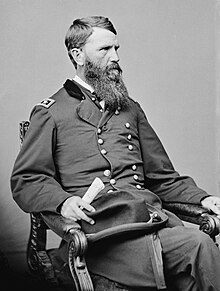
Back فرانسيس بريستون بلير جونيور Arabic فرانسيس بريستون بلير جونيور ARZ فرانسیس پی. بلر جونیور AZB Francis Preston Blair, Jr. Danish Francis Preston Blair junior German فرانسیس پی. بلر جونیور Persian Francis Preston Blair, Jr. French Francis P. Blair, Jr. Hungarian Frank P. Blair Jr. Italian フランシス・プレストン・ブレア・ジュニア Japanese
Francis Preston Blair Jr. | |
|---|---|
 Blair in 1862 | |
| United States Senator from Missouri | |
| In office January 20, 1871 – March 3, 1873 | |
| Preceded by | Daniel T. Jewett |
| Succeeded by | Lewis V. Bogy |
| Member of the U.S. House of Representatives from Missouri's 1st district | |
| In office March 4, 1857 – March 3, 1859 | |
| Preceded by | Luther M. Kennett |
| Succeeded by | John R. Barret |
| In office June 8, 1860 – June 25, 1860 | |
| Preceded by | John R. Barret |
| Succeeded by | John R. Barret |
| In office March 4, 1861 – June 10, 1864 | |
| Preceded by | John R. Barret |
| Succeeded by | Samuel Knox |
| Personal details | |
| Born | February 19, 1821 Lexington, Kentucky, U.S. |
| Died | July 8, 1875 (aged 54) St. Louis, Missouri, U.S. |
| Resting place | Bellefontaine Cemetery |
| Political party | Democratic (before 1848, 1866–75) Free Soil (1848–54) Republican (1854–61) Union[a] (1861-66) |
| Spouse | |
| Children | 8 |
| Parent |
|
| Relatives | Montgomery Blair (brother) Benjamin Gratz Brown (cousin) |
| Education | Yale University University of North Carolina, Chapel Hill Princeton University (BA) Transylvania University |
| Signature | |
| Military service | |
| Allegiance | |
| Branch/service | U.S. Army (Union Army) |
| Years of service | 1861–1865 |
| Rank | |
| Commands | 1st Brigade, 4th Division, XV Corps 2nd Division, XV Corps XV Corps XVII Corps |
| Battles/wars | Mexican- American War American Civil War |
Francis Preston Blair Jr. (February 19, 1821 – July 8, 1875) was a United States Senator, a United States Congressman and a Union Army major general during the American Civil War. He represented Missouri in both the House of Representatives and the Senate, and was active in preventing the State of Missouri from being absorbed into the Confederacy at the beginning of the war.
Blair was instrumental in appointing Nathaniel Lyon as the new military commander of the Western Department of the U.S. Army. He assisted Lyon in securing help of the St. Louis Home Guard in moving over 20,000 rifles and muskets from the St. Louis Arsenal to Illinois. Missouri secessionists considered this event as breaking of informal truce established in the state. This set the scene for the Camp Jackson Affair and continuing guerrilla activity by outraged pro-slavery elements. In 1862, Blair joined the Missouri volunteers, being promoted major general, commanded a division at Vicksburg under Sherman, took part in Sherman's March to the Sea and ended the war as a corps commander.
In 1868, he was Horatio Seymour's vice-presidential candidate, but his dramatic speeches about the dangers of black emancipation were believed by some to have cost the Democrats the election. Blair suffered a paralyzing stroke in 1872, but continued to be active in state politics until his death three years later.
- ^ Parrish, William E. (1973). A History of Missouri, Volume 3: 1860 to 1875. Columbia, Missouri: University of Missouri Press. pp. 93–94, 101, 107–8. ISBN 978-0-8262-0108-9.
Cite error: There are <ref group=lower-alpha> tags or {{efn}} templates on this page, but the references will not show without a {{reflist|group=lower-alpha}} template or {{notelist}} template (see the help page).